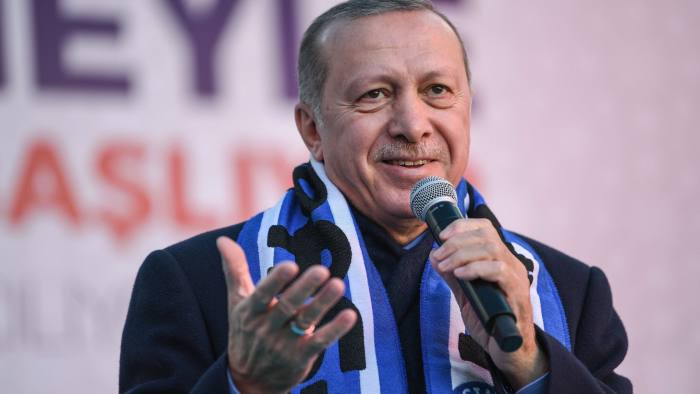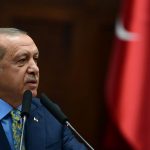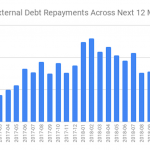Recep Tayyip Erdogan has moved towards authoritarianism in recent years © AFP
The editorial board
Recep Tayyip Erdogan took power in Turkey in 2003, offering stable civilian leadership, a new drive for EU membership and a business-friendly approach. In recent years, Mr. Erdogan has moved towards authoritarianism, alienating western allies and adopting questionable stewardship of the economy. Choosing to purchase Russian military hardware has raised further concerns. Yet Mr. Erdogan has a real chance to change course and restore a relationship which is just as valuable to Turkey as to America and Europe.
According to US officials, the installation of the Russian S-400 air defense system risks compromising details of the F-35 fighters due to be delivered to Turkey in November. US threats include sanctions and stopping delivery of the F-35s. The apparent tilt to the east can be overstated. Russia and Turkey’s relations have significantly improved from 2015 when a Russian jet was downed by Turkish forces, leading to two casualties. The relationship is born at least partly of necessity, however, driven by Russian involvement in Syria. Turkey has a 910km-long border with the war-torn state and hosts more than 3.5m of its refugees. Diplomacy with Moscow, such as the tenuous ceasefire in Idlib, is vital for Turkey.
The distrust of the west is another stumbling block. The US choice to arm and train Kurdish fighters in Syria provoked animosity in Turkey due to close links between fighters and the Kurdistan Workers’ party. The PKK is considered a terrorist group by both Turkey and the US, and has been engaged in more than 30 years of armed struggle against the Turkish state.
The US response last year to the arrest of a North Carolinian pastor has also frayed Ankara’s trust in the west. US tariffs pushed Turkey into a recession in the last two-quarters of 2018 and inflation still sits at about 20 percent. To counter high food prices, state-run stalls are selling cheap vegetables in Istanbul and Ankara, which will be critical battlegrounds during nationwide local elections later this month. Foreign investment has also suffered under Mr Erdogan, with investors concerned by the Turkish president’s economic management, the erosion of the rule of law and the centralization of power around a tight-knit circle.
Yet despite his misgivings, the west offers Mr Erdogan’s best chance for economic recovery. During last year’s economic crisis, Turkey reached out to China, Qatar, and Russia for help, with lackluster results. The EU remains Turkey’s largest trading partner and the portfolio managers who pump money into Turkish bonds and equities sit in cities such as London, Frankfurt and New York. Mr. Erdogan’s distrust cannot shift economic reality.
After March 31, Mr. Erdogan will have a four-year stretch without elections. This offers time to reset foreign diplomatic and economic relations. Mr. Erdogan will not become a democratic reformer, but there is a chance for him to repair his country’s relationship with the west. As a Nato member that borders Iran, Iraq, and Syria, Turkey is a strategically vital partner for the US as well as the EU. Both Washington and those in European capitals have shown willingness to overlook Turkey’s democratic slide and focus on co-operation on trade, refugees and counterterror.
The key obstacle remains the S-400s. Mr. Erdogan has repeated that he will not back down, claiming President Donald Trump understood his concerns. He has made U-turns before, however, over the Russian jet and the American pastor. Mr. Erdogan has the power to salvage and rebuild relations. He should show the will to pursue this approach for the sake of all parties involved.
Source: FT



